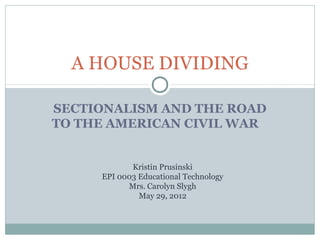
Road to Civil War PowerPoint
- 1. A HOUSE DIVIDING SECTIONALISM AND THE ROAD TO THE AMERICAN CIVIL WAR Kristin Prusinski EPI 0003 Educational Technology Mrs. Carolyn Slygh May 29, 2012
- 2. What We Will Cover Today
- 3. Guiding Questions to Think About 1. How did the Missouri Compromise of 1820 illustrate the widening divide between northern and southern states? 2. What were the leading arguments against slavery in the antebellum era and how did slaveholders defend the "peculiar institution"? 3. How did the 1860 election of Abraham Lincoln lead to the secession of southern states and eventually civil war?
- 4. The North in the 1820s • Industrial centers like New York, Boston, & Philadelphia. • Most northerners considered slavery barbaric and cruel.
- 5. The South in the 1820s • Heavily agrarian in economy & outlook. • Used slaves to operate large plantations. • Southern states angry about taxes on foreign imports used to fund northern factories.
- 6. The Missouri Compromise: A Temporary Solution Missouri applies for statehood in 1819. Maine applies for statehood in 1820. The north wants them to be free states. The south wants them to be slave states. • But America was also expanding west towards the Pacific coast. Would these states be slave or free?
- 7. The Fight Over Slavery The South: “our peculiar The North: Abolition institution” Northern states began Southern states regarded abolishing slavery after slavery as crucial to their 1776. agrarian economy. Abolitionists (anyone who Pro-slavery argued that opposes slavery) thought slavery was less cruel than it totally inhumane and work in Northern factories economically infeasible. South calls it their Free states were richer “peculiar institution” than slave states.
- 8. Repeals the Missouri Compromise. Admits Kansas & Nebraska as states. Popular Sovereignty decides if they are slave states. The Kansas-Nebraska Act of 1854
- 9. The Kansas-Nebraka Act, continued Popular Sovreignty meant allowing the settlers of Kansas and Nebraska decide on whether they would allow slavery in their state or not. Kansas becomes a battleground for the slavery debate. The North did not want slavery spreading west into Kansas & Nebraska. The South does. America is polarized. Interactive 1854 Map
- 10. •The fight over which new states were declared “free” or “slave” was not only about the institution of slavery •People, and politicians especially, were concerned about the balance of power in Was the division only Congress. about slavery? •America Divided Video
- 11. Lincoln Enters the Political Arena Again Abraham Lincoln had been a congressman during the Mexican-American War, but left public service for 5 years to attend to his law practice. •After the passage of the Kansas-Nebraska Act, Lincoln decided to reenter politics to fight the spread of slavery westward. •Although he had always wanted slavery to end, he knew early on there would be no peaceful means to do so.
- 12. The Start of the 1860 Election One of the most contentious elections in American history. America had been deeply divided for almost ten years leading up to it.
- 13. The 1860 Election Four delegates ran for president in this election: Abraham Lincoln, Republican, Illinois John C. Breckenridge, Southern Democratic, Kentucky John Bell, Constitutional Union, Tennessee Stephen A. Douglas, Democrat, Illinois Thisrace would ultimately decide the fate of the union, and whether the south would secede
- 14. Electoral College Voting Results for the 1860 Election
- 15. States are already starting the secesion process before Lincoln is even inagurated on the steps of the as yet unfinished capitol buildingThe Lincoln Wins the 1860 Road to War Election Video
- 16. Lincoln Tips the Scales Lincoln’s election is a breaking point for many southern states that wish to preserve their autonomy, especially as it relates to slavery, which they consider their livlihood. South Carolina is the first to secede in 1860.
- 17. The Confederate States of America After Lincoln was elected, 11 states seceded to form the Confederate States of America in 1861
- 18. The Road to Civil War The Civil War did not begin because these 11 southern states seceded. The Civil War began because Lincoln and the Union decided to resist the secession, and push back, forcing the confederacy to rejoin the Union. Pictured left, one of the first battles of the Civil War at Fort Sumter, South Carolina
- 19. The Road to Civil War Going into the war it was unclear which side had the most advantage. Because the North and South had developed so differently over the past 50 years they had many different advantages. The North had manpower and industry, but the South had highly trained military leaders.
- 20. Conclusion & Summary The path to the American Civil War started more than 40 years before any actual fighting took place because the North and South were so divided. The issue of slavery was at the heart of this division. The Missouri-Compromise and the Kansas-Nebraska Act attempted to resolve the issue. Ultimately the election of Lincoln would drive southern states to secede, and the union would respond in battle.
- 21. Questions for Review What was the significant legislation that intesified the North-South divide? How did southeners characterize slavery? Could the Civil War have been prevented? Why or why not?
- 22. References United States Library of Congress. Retrieved May 24, 2012 from http://www.loc.gov/index.html HarpWeekly. Retrieved May 24, 2012 from http://www.harpweek.com/ Edsitement. Retrieved May 15, 2012 from http://edsitement.neh.gov/curriculum-unit/growing- crisis-sectionalism-antebellum-america-house- dividing
